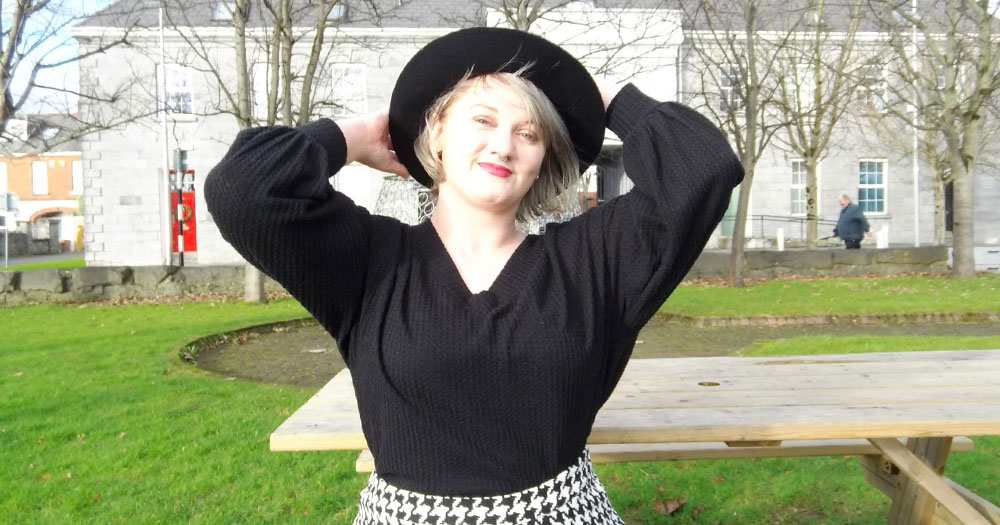“Asexuality can mean a lot of different things for a lot of different people,” Rachel Whitbeck tells GCN.
“For me, being asexual is not experiencing sexual attraction to anyone, never wanting to participate in any sexual activities. But you know, still enjoying reading erotic fanfiction.”
Rachel is a 28 year-old PhD student of Sociology in Limerick and it wasn’t until earlier this year that she fully understood her own sexual identity as someone who is asexual.
“So I thought I was straight for a long time,” she tells us, echoing the experiences of many LGBTQ+ people. “Then when I was about 20 I thought, no, maybe I’m bi because I find a lot of people aesthetically pleasing and I confused that with sexual attraction. But I still was never interested in having sex. So that was strange to me.
“Every time what was kind of a crush would turn into, like, an actual romantic possibility I would nope the f*ck out.”
As well as being asexual, Rachel also happens to be aromantic meaning that she has no interest in romantic relationships. “But I still like to read love stories,” she adds.
For many, accepting one’s sexuality can be a turbulent affair, but for Rachel the discovery of her sexuality and her romantic orientation was nothing but positive.
“It was a moment of epiphany and revelation and serenity and contentment,” she happily tells us. “And yeah, it cleared up a lot of confusion for me, and it’s been fantastic knowing.” She later adds, “I consider myself quite queer, I suppose, being asexual and aromantic.”
Although the discovery was a relief for Rachel, she mentions, “Confusion isn’t necessarily a bad thing. It, you know, allows you to stay curious and kind of keep poking around. But when you do find a label that fits you, and if you’re the kind of person who kind of wants to label, yeah, it can be fantastic.”
Rachel is one of the lucky ones who is surrounded by supportive people accepting of her asexuality, but she acknowledges that many people know less about being ace than they do other sexualities.
“The best way to understand anything is to talk to people who identify or are certain things. So you know, talking to your local friendly neighbourhood aces will get you somewhere,” she says.
“But there’s also, you know, plenty that you can read online, just like LGBT wiki. That even goes into the sub-identities within, like, asexuality. That’s where I was hanging out, so that’s a good place to start.”
Even on the asexuality spectrum, the experiences and preferences of people who are ace are as individual as the people themselves.
“There are definitely people who are sex averse,” Rachel explains. “They find it disgusting, even to the point where they don’t want to see it in media. But then there are asexuals who have sex like, man, it’s not my jam, but I have a partner and they like sex and like, I don’t hate it. So yeah, I’ll do that for my partner.
“Some asexuals even enjoy it! They just don’t experience a sexual attraction. Like, once they eat that doughnut, yeah, it’s a pretty damn good doughnut… but they weren’t craving a doughnut, you know?”
On the subject of the asexuality spectrum, Rachel filled us in on some sub-identities within. “So you’ve got your allosexuals who experience sexual attraction; they probably do the sexual thing, or maybe they don’t for other reasons.
“Then you’ve got, like, demisexuals are those who require a strong romantic connection or even just a personal connection before they experience sexual attraction.
“Then there are greysexuals, or grey asexuals, who experience sexual attraction a few times in their life, or maybe only toward one or two people in their life, and then there are asexuals who don’t experience it at all.
“But as I said, there are sub-identities that I don’t think are very often used. I just happen to stumble across one, aegosexual, where I enjoy sexual media, but I don’t want to participate at all.
“So, you know, to all those people who are confused because they don’t want to have sex but they enjoy reading erotic fiction or watching sex on TV or even enjoy porn: you’re valid, it’s fine.”
© 2021 GCN (Gay Community News). All rights reserved.
Support GCN
GCN is a free, vital resource for Ireland’s LGBTQ+ community since 1988.
GCN is a trading name of National LGBT Federation CLG, a registered charity - Charity Number: 20034580.
GCN relies on the generous support of the community and allies to sustain the crucial work that we do. Producing GCN is costly, and, in an industry which has been hugely impacted by rising costs, we need your support to help sustain and grow this vital resource.
Supporting GCN for as little as €1.99 per month will help us continue our work as Ireland’s free, independent LGBTQ+ media.
